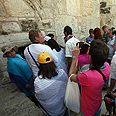
PA shops sell Jewish, Israeli souvenirs
Palestinian tourism industry struggles push beyond cultural taboo as owners of some souvenir stores start selling Israeli items to satisfy global visitors
While it is normal for a tourist in Jerusalem’s Old City to see Palestinian and Israeli souvenirs sold side-by-side, this scene is relatively rare in the West Bank.
That seems to be changing.
Most shops sell Palestinian-made olive wood Christmas ornaments, along with decorative pieces, like jewelry boxes. But at Mary George’s shop, where visitors are welcomed with a smile, there’s something for everyone.
“Most of the olive-wood items I sell are for Christians,” she told The Media Line. “I have a few pieces for Muslims, mostly representing the Dome of the Rock, and I also have Jewish gifts.”
Aside for menorahs, Jewish ritual candelabra used on the holiday of Hanukkah, George sells mugs and shirts with the words “Peace, Shalom, Salam,” the Hebrew and Arabic synonyms for peace, which are some of her best sellers.
“As a Palestinian I respect all religions,” she said. “But I can’t sell an Israeli flag in my store, or an “I Love Israel” shirt. I am a proud Palestinian.”
'It's only for business reasons'
Though George makes a distinction between Jewish and Israeli symbols, owners of some souvenir shops have started selling Israeli items to satisfy international visitors.Next to George, another store offers Israeli flag magnets, along with a book about Israel, and mirrors that have the word “Israel” on them.
“It’s only for business reasons,” the shop owner told The Media Line under the condition of anonymity. “We have tourists who come from all over the world.”
Adding that that the Palestinian Authority has acknowledged Israel as a state, he said he doesn’t support Israel but tries to offer items that his clients want.
Some Palestinians who have passed these stores expressed anger at the Israeli flag products.
“Many of the tourists used to come through an Israeli office that brings the groups to the church of Nativity and bring them back,” the store owner said.
He explained that the stores now are cutting deals with tour guides and tourism offices to bring tourists to their shops.
Tourism has been hit hard since 2000, the beginning of the second Intifada. Until recently, Palestinians working in the industry suffered from lack of tourists, especially those willing to reside in West Bank hotels.
Bethlehem, the birthplace of Jesus Christ, is one of the main attractions for people visiting the Holy Land, and though political and security concerns have had a toll, the situation is slowly getting better.
“The numbers are not great, but there is an increase by 26% in the numbers of tourists coming into the city,” Jeries Qumsieh, the public relations director in the Palestinian Tourism Ministry, said.
Star of David, mezuzah, tallit
Qumsieh told The Media Line that the Tourism Ministry doesn’t intervene concerning objects sold in these shops, since there are no laws against offering Israel-related items. But the Ministry does have certain preferences.“We don’t have the right to prevent it, but we still have not signed a final status agreement with Israel and we don’t prefer selling a flag that refers to an occupying country,” he said. “This is a national sentiment that should come internally from the sellers, but we will not enforce them not to sell it.”
Issa Ghanema works in a store in nearby Beit Sahour that sells Stars of David, mezuzahs and tallit.
“Although the tallit is made from the Israel flag colors,” he said, “it’s a religious symbol.”
But even such religious Jewish items are controversial for some visitors.
“While most tourists like to ask us if we’re in Palestine or Israel, others are more conservative,” Ghanema’s colleague Daoud Naji commented. “There is a Christian American pastor who is pro-Palestinian. He gets really mad when he sees us selling anything that is related to Israel, so we have to deal with that psychology, too.”
He said that groups coming from Holland are the most likely to buy Jewish items, while the peace-mug is purchased by people from all over the world.
Mary George said tourists from the United States and Poland are the most likely to buy the Jewish products.
“We know that many Jews visit us and we welcome them all,” she said, smiling.
Article written by Diana Atallah
Reprinted with permission from The Media Line










